
MARINE GEOPHYSICAL RESEARCH
Scope & Guideline
Illuminating the interplay of earth and ocean.
Introduction
Aims and Scopes
- Marine Geophysics:
The journal emphasizes the use of geophysical techniques such as seismic reflection, refraction, and electromagnetic methods to study the geological structures of the seabed and sub-seafloor. - Sediment Characterization:
Research often involves the analysis of marine sediments, including their physical, chemical, and mechanical properties, which are crucial for understanding sediment dynamics and geohazards. - Hydrocarbon Exploration:
A significant focus is placed on the exploration of hydrocarbon reservoirs, including studies on gas hydrates and petroleum systems, which are vital for energy resources. - Geohazards and Tectonics:
The journal covers assessments of geohazards such as tsunamis, landslides, and earthquakes, along with tectonic studies that provide insights into geological processes affecting marine regions. - Interdisciplinary Approaches:
The journal promotes interdisciplinary research that integrates geophysical, geological, and environmental data to provide comprehensive insights into marine systems.
Trending and Emerging
- Machine Learning Applications:
Recent publications highlight the increasing use of machine learning techniques for data analysis in marine geophysics, indicating a trend towards more sophisticated analytical methods. - Climate Change Impact Studies:
There is a growing focus on the effects of climate change on marine environments, including studies on sediment dynamics and geohazards related to changing ocean conditions. - Hydrate Research and Energy Resources:
Research on gas hydrates and their potential as energy resources is gaining traction, reflecting a renewed interest in sustainable energy solutions. - Advanced Imaging Techniques:
The use of high-resolution imaging and mapping technologies to study seafloor structures and fluid migrations is increasingly prevalent, showcasing advancements in geophysical research methodologies. - Integrated Environmental Assessments:
Emerging studies increasingly combine geophysical data with environmental assessments, addressing the impacts of human activities and natural processes on marine ecosystems.
Declining or Waning
- Traditional Geophysical Techniques:
There is a noticeable decline in publications focused solely on traditional geophysical methods without integration with modern technologies or interdisciplinary approaches. - Pure Geological Studies:
The journal has seen fewer studies that are purely geological in nature, suggesting a shift towards more integrated research that combines geology with geophysical and environmental sciences. - Regional Studies:
There appears to be a waning interest in studies focused solely on specific regional assessments without broader implications or comparisons to global marine processes.
Similar Journals
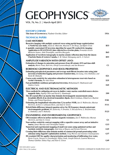
Geophysics
Pioneering Insights in Geophysics and BeyondGeophysics, published by the SOC EXPLORATION GEOPHYSICISTS - SEG, is a prestigious journal notable for its significant contributions to the fields of geophysics, geochemistry, and petrology. Since its inception in 1936, this journal has consistently provided a platform for high-quality research, maintaining a strong impact within the academic community, evidenced by its Q1 ranking in these important scientific categories for 2023. With an ISSN of 0016-8033 and an e-ISSN of 1942-2156, it features rigorous peer-reviewed articles that address the latest advancements in geophysics and related disciplines, contributing to a deeper understanding of Earth processes. Although it does not offer open access options, the journal ensures broad dissemination of knowledge and remains essential for researchers, professionals, and students dedicated to exploring energy resources and geophysical phenomena. Its Scopus rankings, including a commendable 22nd out of 165 in Earth and Planetary Sciences for Geophysics, affirm its importance and reach in the academic community. In addition to fostering scholarly discourse, Geophysics plays a critical role in advancing the practical applications of geophysical research, making it a vital resource for those engaged in exploration and environmental studies.

Bollettino di Geofisica Teorica ed Applicata
Connecting Theory and Application in Geophysical Studies.Bollettino di Geofisica Teorica ed Applicata is a distinguished journal in the fields of geophysics and oceanography, published by the IST NAZIONALE DI OCEANOGRAFIA E DI GEOFISICA in Italy. With an ISSN of 0006-6729 and an E-ISSN of 2239-5695, this journal provides a platform for pioneering research and scholarly discussions devoted to the advancement of theoretical and applied geophysics. Although access options have transitioned over the years, the journal maintains a strong commitment to disseminating valuable insights to the scientific community. As of 2023, it holds a respectable Q4 ranking in both geophysics and oceanography, reflecting its dedication to scholarly contributions within these fields. Researchers and professionals are encouraged to explore current and past issues to stay informed about the latest findings and methodologies impacting geophysical and oceanographic studies. For further inquiries, the journal's editorial office is located at BORGO GROTTA GIGANTE, 42-C, SGONICO, TRIESTE 34010, ITALY.

Frontiers in Earth Science
Unveiling the Secrets of Our Planet's Past and FutureFrontiers in Earth Science is a leading open-access journal published by FRONTIERS MEDIA SA, based in Switzerland. With its ISSN N/A and E-ISSN 2296-6463, this journal has firmly established itself in the realm of Earth and Planetary Sciences, evidenced by its exceptional Q1 ranking in the 2023 category of Earth and Planetary Sciences (miscellaneous) and a solid position of Rank #66/195 in Scopus, placing it in the 66th percentile among its peers. Since its inception in 2013, Frontiers in Earth Science has embraced the open access model, promoting widespread dissemination and accessibility of research findings. The journal covers a broad scope, including areas such as geology, meteorology, oceanography, and environmental science, fostering interdisciplinary communication and advancement. Researchers, professionals, and students looking to stay at the forefront of Earth science research will find an invaluable resource in this journal, which not only curates high-quality research but also supports innovative and impactful studies that address the pressing challenges facing our planet today.

Geophysics and Geophysical Exploration
Advancing Earth Science Through Innovative Geophysical ResearchGeophysics and Geophysical Exploration is a prestigious journal dedicated to advancing the fields of geophysics and geophysical exploration. Published by the Korean Society of Earth & Exploration Geophysicists, this journal serves as a vital platform for researchers, professionals, and students to share innovative findings and developments in geophysical methods and technologies. The journal covers a broad range of topics including but not limited to seismic analysis, subsurface modeling, and remote sensing techniques, aimed at addressing the complex challenges in Earth science exploration. Although it does not currently offer open access options, the journal maintains rigorous peer-review standards, ensuring high-quality and impactful research contributions. With its commitment to fostering knowledge exchange in the geophysical community, Geophysics and Geophysical Exploration plays a critical role in enhancing our understanding of the Earth, making it an essential resource for those interested in geoscience and related fields.
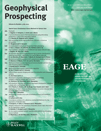
GEOPHYSICAL PROSPECTING
Pioneering Insights into Earth's Structure and ProcessesGEOPHYSICAL PROSPECTING is a premier journal published by Wiley, dedicated to the fields of geophysics and geochemistry. With an impressive impact factor, it holds a notable place in academic circles, boasting a ranking of Q1 in Geophysics and Q2 in Geochemistry and Petrology for 2023. The journal, ISSN 0016-8025 and E-ISSN 1365-2478, features cutting-edge research addressing key challenges in understanding the Earth's structure and processes. It has been an influential platform since its inception in 1953 and continues to converge towards its goal of disseminating integral geophysical advancements through 2024. Although not open access, researchers can benefit from its wealth of high-quality articles, substantiated by commendable rankings of 41st in Geophysics and 53rd in Geochemistry and Petrology. From its headquarters in the United Kingdom, GEOPHYSICAL PROSPECTING not only contributes to the theoretical advancement of these fields but also aids practical applications in environmental exploration and resource management, making it an essential resource for researchers, students, and professionals alike.
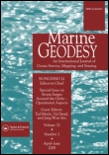
MARINE GEODESY
Charting New Waters in Marine ScienceMARINE GEODESY, an esteemed journal published by Taylor & Francis Inc, delves into the intricate field of oceanography, aiming to contribute profoundly to the understanding of marine spatial dynamics and geophysical processes. With an ISSN of 0149-0419 and an E-ISSN of 1521-060X, this journal has a commendable standing, currently classified in the 2023 Q2 quartile, reflecting its influential presence in the realm of Earth and Planetary Sciences, particularly oceanography, where it ranks 49th out of 145 journals. Since its inception in 1977 and its ongoing publication until 2024, MARINE GEODESY has been dedicated to disseminating groundbreaking research, case studies, and reviews that are crucial for scholars, professionals, and students engaged in the exploration of marine environments. While currently not an open-access journal, it nevertheless offers vital insights into marine geospatial analytics and geodesy, augmenting the knowledge base necessary for tackling contemporary challenges in marine science and geography.
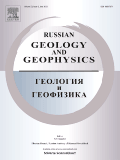
Russian Geology and Geophysics
Navigating the Complexities of Earth's SystemsRussian Geology and Geophysics is a seminal journal published by GEOSCIENCEWORLD that plays a pivotal role in the dissemination of vital research within the realms of Earth-Surface Processes, Geology, and Geophysics. With an ISSN of 1068-7971 and an E-ISSN of 1878-030X, this journal has witnessed a continuous evolution since its convergence in 2007 and is poised to thrive through 2024. While it is not an Open Access journal, it is recognized for its significant contributions to the academic community, holding a respectable Q2 ranking in Earth-Surface Processes and Q3 rankings in both Geology and Geophysics as of 2023. The journal’s impact factors align it within competitive quartiles, marking it as an essential resource for researchers and professionals seeking to stay at the forefront of geological and geophysical sciences. By publishing high-quality peer-reviewed articles, the journal fosters an environment of knowledge sharing and innovation, making it indispensable for students, practitioners, and scholars alike who are dedicated to advancing our understanding of Earth's complex systems.
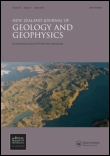
NEW ZEALAND JOURNAL OF GEOLOGY AND GEOPHYSICS
Advancing Knowledge in Geology and Geophysics.NEW ZEALAND JOURNAL OF GEOLOGY AND GEOPHYSICS, published by Taylor & Francis Ltd, stands as a prominent forum dedicated to the interdisciplinary exploration of geological and geophysical phenomena. With an impact factor that situates this journal in the prestigious Q1 category across key subjects—namely Earth and Planetary Sciences, Geology, and Geophysics—it is a critical resource for researchers, professionals, and students alike. The journal has been operational since 1958 and continues to contribute valuable insights into the complexities of the Earth's processes. Although it does not currently offer Open Access options, its broad readership benefits from an extensive archive of high-quality research findings that span from 1958 to 2024. Located in the United Kingdom, the journal remains a pivotal player in advancing the understanding of Earth's systems, making significant contributions to both academic inquiry and practical applications in the field.

Physical Oceanography
Advancing Knowledge in Oceanic ProcessesPhysical Oceanography is an esteemed open-access journal dedicated to the exploration and dissemination of research on the dynamic processes that govern the physical aspects of oceans. Published by the Federal State Budget Scientific Institute, Marine Hydrophysical Institute, this journal provides a forum for innovative studies and significant findings in the fields of fluid flow, geophysics, ocean engineering, and water science. With an ISSN of 0928-5105 and an E-ISSN of 1573-160X, Physical Oceanography has been granting open access to its valuable content since 2015, ensuring widespread accessibility and impact in the scientific community. Its rigorous peer-reviewed articles are crucial for researchers, professionals, and students who aim to advance their knowledge and understanding of the intricacies that govern our oceans. With a current impact factor reflecting its solid standing in the Q3 category across multiple disciplines, including oceanography and geophysics, this journal remains a vital resource for advancing oceanographic research and innovation.

GEO-MARINE LETTERS
Connecting Science to the Depths of Our PlanetGEO-MARINE LETTERS, published by Springer, is a prestigious academic journal that has been a pivotal platform for the dissemination of innovative research in the fields of Earth and Planetary Sciences, Oceanography, Environmental Science, and Geotechnical Engineering since its inception in 1981. With an E-ISSN of 1432-1157, this journal has established itself in the Q2 quartile across multiple categories in 2023, indicating its influential position within the scientific community, as reflected by its Scopus rankings. While it currently does not offer an open access option, its rigorous peer-review process ensures the publication of high-quality research that contributes significantly to advancing our understanding of marine and geological sciences. Researchers, professionals, and students alike will benefit from the diverse scope of studies featured in GEO-MARINE LETTERS, making it an essential resource for those engaged in environmental and marine research. Situated in Germany, the journal's commitment to excellence continues to shape critical discussions and innovations in the field.